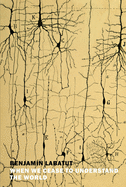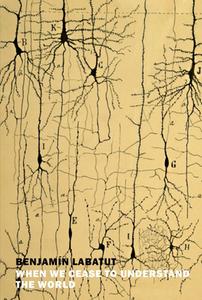
 Benjamin Labatut's When We Cease to Understand the World is an astonishing historical novel of physics, war, human weakness and quantum physics. In a lovely translation from the Spanish by Adrian Nathan West, the fictionalized histories of Albert Einstein, Werner Heisenberg, Erwin Schrödinger and more come alive to disquiet and intrigue readers.
Benjamin Labatut's When We Cease to Understand the World is an astonishing historical novel of physics, war, human weakness and quantum physics. In a lovely translation from the Spanish by Adrian Nathan West, the fictionalized histories of Albert Einstein, Werner Heisenberg, Erwin Schrödinger and more come alive to disquiet and intrigue readers.
The book opens with Hermann Göring's addiction to dihydrocodeine and the suicides of many Nazi leaders by cyanide in the final months of World War II. It gets only a little less grim from there. But even with such bleak subject matter, Labatut's imaginative evocations of disturbed minds from the rarified ranks of mathematics and physics are thoroughly captivating and strangely lovely, joining science with mysticism in surprising ways. "In the deepest substrate of all things, physics had not found the solid, unassailable reality Schrödinger and Einstein had dreamt of, ruled over by a rational God pulling the threads of the world, but a domain of wonders and rarities, borne of the whims of a many-armed goddess toying with chance."
Labatut's narrative travels in time and space, covering the development of pesticides, chemical weapons and Prussian blue pigment; painting, literature and opera; the existential angst of particle and quantum physics; eroticism and fever dreams. A young Heisenberg interrupts Schrödinger's lecture to argue about the nature of subatomic particles. Later the reader sees Heisenberg feverish, ill, madly dreaming of spectral lines and harmonically bound electrons while reading Goethe's poems inspired by the Persian mystic Hafez. Schrödinger also raves, theorizing and obsessing over the adolescent daughter of his physician. Lesser-known scientific figures include Karl Schwarzschild, the soldier who first exactly solved Einstein's equation of general relativity and died shortly after; Shinichi Mochizuki, who revolutionized mathematics and then withdrew from the field; Alexander Grothendieck, who fled society to live as a hermit and also gave up mathematics entirely; and the seventh duc de Broglie, a "timid prince" whose Nobel Prize did not help him stomach the infighting among scholars of theoretical physics. These are the figures and the stories that have shaped major advances in science in the modern era; they also verge on insanity.
This astonishing novel blends forms: lyrical, inventive and also rooted in history, concerned with the overlaps of genius and madness, innovation and destruction. "The physicist--like the poet--should not describe the facts of the world, but rather generate metaphors and mental connections.... That aspect of nature required a completely new language," writes Labatut, and likewise he offers a new way of writing about science and history. The vision of reality painted by When We Cease to Understand the World is terrifying but finely wrought, and will live long in readers' minds. --Julia Kastner, librarian and blogger at pagesofjulia
Shelf Talker: Wide-ranging, mystical, crazed and inspired, this singular novel explores theoretical physics through a series of weird, engrossing human stories.

